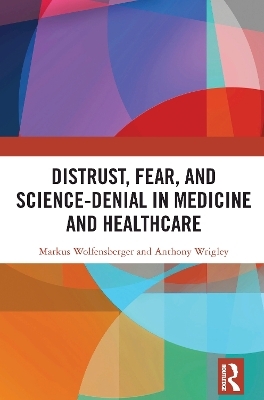
Distrust, Fear, and Science-Denial in Medicine and Healthcare
Routledge (Verlag)
978-1-032-80375-3 (ISBN)
Over recent decades, the decline of trust, mounting of fears, and increasing denial of science appear as a marked shift of societal attitudes towards many institutions and professionals. This book analyses these developments and looks at their role in medicine and healthcare, both in terms of the patient-physician relationship and for delivering high-quality healthcare, in order to establish why we need trust and what can be done to restore it. The book begins by offering a conceptual analysis and definition of trust, using a ‘pattern definition’ based upon typical features and common usage of the term, as well as the related concepts of hope, fear, and belief. It charts evidence for the decline of public trust in various professions, and then looks at the causes, as well as the accompanying growth of fear and the rejection of science. The study addresses possible options for restoring trust in medicine and healthcare, be it in individual physicians, in hospitals, or in managed care institutions. Written jointly by a medical doctor and an academic specialising in biomedical ethics, the book will be of interest to those working in the areas of biomedical ethics and law, medicine and healthcare, public health, philosophy, sociology, politics, and psychology.
Markus Wolfensberger is Emeritus Professor of Otorhinolaryngology and Doctor of medical ethics. He has held positions as Head of the Department of Otorhinolaryngology and Director of the Head and Neck Tumour Centre at Basel University Hospital, Switzerland. Anthony Wrigley is Professor of Ethics at the University of Keele, U.K. He specialises in bioethics and applied ethics. Much of his work focuses on ethical and policy issues on the margins of life (beginnings and ends) and the analysis of concepts used in bioethical debate, such as vulnerability, hope, and trust.
Preface xi Synopsis xiii Acknowledgements xv About the authors xvi Introduction 1 PART I Definitions: of trust, hope, fear, belief, and some related concepts 3 1 Trust, mistrust, and distrust 5 1.1 The concept of pattern-based definitions 6 1.2 The pattern of the features of trust in physicians 8 1.3 Trust as expectation 9 1.4 Trust as relationship 12 1.5 Uncertainty and risk 12 1.6 Trust as choice 14 1.7 Justification of trust I: epistemic trust 16 1.8 Justification of trust II: trust in physicians 21 1.9 Trust versus confidence 27 1.10 Distrust and mistrust 29 2 Hope, fear, and despair 33 2.1 Hope 33 2.2 Fear 34 2.3 A word on despair 36viii Contents 3 Belief, doubt, and disbelief 37 3.1 Belief 37 3.2 Disbelief 38 3.3 Doubt 39 3.4 Belief versus knowledge 39 3.5 Trust or not trust? trust versus confidence, hope and belief 42 PART II Explanations: of the decline of trust and the rise of fear and science-denial 45 Introduction 47 4 The value of trust 48 4.1 Trust is instrumentally useful . . . 48 4.2 . . . and has a moral worth 51 5 Empirical evidence for the decline of trust in physicians 58 6 Reasons for the decline of trust in physicians 61 6.1 The loss of status-based trust 62 6.2 The difficulty of establishing merit-based trust by assessing physicians’ trustworthiness 66 6.3 Changed perceptions of competence 68 6.4 Changed perceptions of commitment 72 6.5 Changes of risk awareness and risk acceptance and the rise of fear 74 7 The rejection of science and reason 84 7.1 The role of science in differentiation between true and false beliefs 84 7.2 The denial of science and the rise of pseudoscience 89 7.3 Discrediting scientific medicine and the rise of alternative medicine 96 8 From justified fears to irrational beliefs and conspiracy theories 102 9 ‘Why can’t people be more like us?’ on relativist, postmodernist, subjectivist, post-truth, anti-scientific, and anti-expert thinking 109 PART III Suggestions: Regarding the restoration of trust and the countering of fear, science-denial, and pseudoscience 113 Introduction 115 10 Dispelling two illusions regarding the restoration of trust 117 10.1 The illusion of a possible return to status trust – and why external regulations are not sufficient 117 10.2 Why no contract can replace trust 119 11 How to establish and maintain trust 122 11.1 It always takes two to trust: how to build a trust-based relationship between patient and physician 122 11.2 Why being trustworthy is not enough: how to signal trustworthiness 123 11.3 Trust in managed care 128 12 Countering fear, science-denial, and pseudoscience 132 12.1 Fear 132 12.2 Science-denial and the rise of pseudoscience 135 Epilogue 139 Index 142
| Erscheinungsdatum | 12.09.2024 |
|---|---|
| Zusatzinfo | 1 Tables, black and white; 8 Line drawings, black and white; 8 Illustrations, black and white |
| Verlagsort | London |
| Sprache | englisch |
| Maße | 156 x 234 mm |
| Gewicht | 453 g |
| Themenwelt | Sachbuch/Ratgeber ► Gesundheit / Leben / Psychologie |
| Schulbuch / Wörterbuch | |
| Medizin / Pharmazie ► Medizinische Fachgebiete ► Medizinethik | |
| Studium ► 1. Studienabschnitt (Vorklinik) ► Med. Psychologie / Soziologie | |
| Studium ► Querschnittsbereiche ► Geschichte / Ethik der Medizin | |
| Naturwissenschaften ► Biologie | |
| Sozialwissenschaften ► Soziologie | |
| ISBN-10 | 1-032-80375-4 / 1032803754 |
| ISBN-13 | 978-1-032-80375-3 / 9781032803753 |
| Zustand | Neuware |
| Haben Sie eine Frage zum Produkt? |
aus dem Bereich


